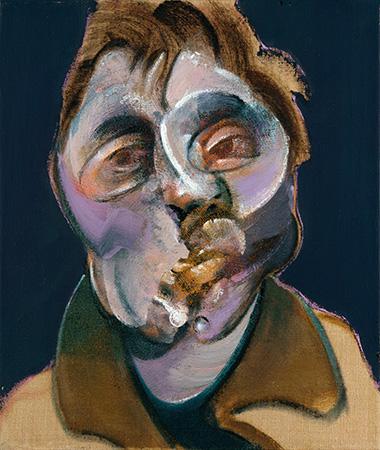Francis Bacon's self-portraits stand as a profound exploration of his inner life, marked by a distinctive blend of introspection and existential angst. In the 1970s, particularly following the tragic death of his lover George Dyer in 1971, Bacon's self-portraiture entered its most introspective phase. He once mentioned that he resorted to painting self-portraits largely because many of his close acquaintances were passing away, leaving him with no other subjects but himself (Sothebys.com). This period saw the creation of some of his most poignant self-images, characterized by their raw emotional intensity and the physical distortion of his features, reflecting Bacon's personal grief and turmoil.
Bacon's self-portraits are often noted for their brutal honesty and the visceral impact of their execution, with thick, broad brush strokes that severely distort his facial features. These portraits, slightly smaller than life-sized and set against depthless, undefined backgrounds, focus intensely on the face itself, inviting contemplation of its psychological depth and the physical ravages of life. This approach results in images that are both deeply personal and universally resonant, highlighting Bacon's mastery of conveying complex emotional states through the manipulation of his own image (Wikipedia).
Despite Bacon's social gregariousness, he was intensely private about his personal life and his art-making process, often painting from photographs rather than life and seldom allowing visitors into his studio. This reclusiveness added a layer of mystery to his self-portraits, providing rare insights into the artist's inner thoughts and feelings during this period (Wikipedia).
Moreover, Bacon's approach to self-portraiture and the thematic content of his work reveal a deep engagement with the human condition, marked by a fascination with the physicality of the human body and the psychological depth of the individual. His self-portraits are not mere physical likenesses but are deeply imbued with the existential concerns that pervade his broader oeuvre. They serve as a testament to Bacon's relentless inquiry into the nature of existence, the self, and the inexorable passage of time. (Francis Bacon).


